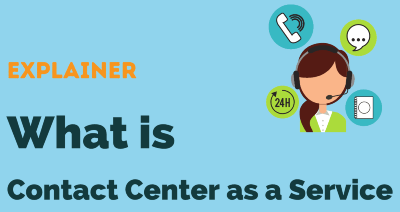In the digital age, customer communication has become the cornerstone of a successful business. With the advent of Contact Center as a Service (CCaaS), companies are now able to revolutionize the way they interact with their customers. This comprehensive guide will delve into the intricacies of CCaaS and how it can be leveraged to improve customer communication.
Key Takeaways:
- Understand the fundamental principles of CCaaS and its impact on customer communication.
- Discover the benefits and features of implementing a CCaaS solution for businesses of all sizes.
- Learn about the future trends in CCaaS and how it is shaping the landscape of customer service.
What is CCaaS and How Does It Transform Customer Communication?
CCaaS stands for Contact Center as a Service, a cloud-based solution that enables businesses to manage customer interactions across various channels seamlessly. Unlike traditional call centers, CCaaS offers a more flexible and scalable approach to customer communication, allowing businesses to adapt quickly to changing customer needs and preferences. By leveraging CCaaS, companies can provide a personalized and efficient service experience, which is crucial in today's competitive market.
The transformation brought about by CCaaS is evident in its ability to integrate multiple communication channels such as voice, email, chat, and social media. This omnichannel approach ensures that customers receive a consistent experience, regardless of how they choose to reach out. Moreover, CCaaS solutions often come with advanced analytics and reporting features, giving businesses valuable insights into customer behavior and service performance.
The Core Benefits of Adopting CCaaS for Your Business
One of the primary benefits of CCaaS is its cost-effectiveness. By utilizing cloud technology, businesses can reduce the overhead costs associated with maintaining physical call centers. Additionally, CCaaS providers typically offer pay-as-you-go pricing models, which means companies only pay for the services they use. This can be particularly advantageous for small to medium-sized businesses that may not have the resources for a large-scale call center operation.
Another significant advantage of CCaaS is its scalability. As a business grows or experiences seasonal fluctuations in customer communication volume, CCaaS can easily scale up or down to meet demand. This level of flexibility ensures that businesses can maintain high-quality customer service without the risk of over or underutilizing resources.
Key Features That Set CCaaS Apart
CCaaS platforms come packed with a range of features designed to enhance customer communication. Interactive Voice Response (IVR) systems, for instance, allow customers to resolve simple issues or find information without the need for a live agent. This not only improves efficiency but also frees up agents to handle more complex inquiries. Additionally, features like call routing and queuing ensure that customers are connected to the most appropriate agent, reducing wait times and improving overall satisfaction.
Another standout feature of CCaaS is the integration of artificial intelligence (AI) and machine learning. These technologies enable features like chatbots and virtual assistants, which can handle routine inquiries and transactions. By automating these interactions, businesses can provide 24/7 customer support, even outside of regular business hours.
How CCaaS Fosters Personalization in Customer Interactions
Personalization is key to building strong customer relationships, and CCaaS excels in this area. By collecting and analyzing customer data, CCaaS platforms can tailor interactions to individual preferences and history. For example, if a customer has previously contacted support about a specific issue, the system can provide the agent with this context, allowing for a more informed and personalized conversation.
Moreover, CCaaS solutions can integrate with Customer Relationship Management (CRM) systems, further enhancing the ability to personalize communication. This integration ensures that all customer interactions, regardless of the channel, are tracked and accessible to agents. As a result, customers feel recognized and valued, which can lead to increased loyalty and retention.
The Role of Analytics in CCaaS
Analytics play a crucial role in the effectiveness of CCaaS. By providing detailed metrics on call times, resolution rates, and customer satisfaction, businesses can identify areas for improvement and make data-driven decisions. These insights can also help in workforce management, ensuring that the right number of agents are available at the right times.
Furthermore, sentiment analysis, a feature found in some CCaaS platforms, can gauge the emotional tone of customer interactions. This information can be invaluable in understanding customer sentiment and adjusting communication strategies accordingly.
Ensuring Security and Compliance in CCaaS Solutions
Security is a top concern for any business handling customer data, and CCaaS providers are well aware of this. Reputable CCaaS platforms are built with robust security measures, including data encryption and compliance with industry standards such as PCI DSS and GDPR. This ensures that sensitive customer information is protected, and businesses can operate with confidence knowing they are adhering to regulatory requirements.
In addition to security features, CCaaS providers often offer disaster recovery and redundancy options. This means that in the event of an outage or other disruption, customer communication can continue without significant interruption, maintaining trust and reliability.
Integration Capabilities: Connecting CCaaS with Other Business Systems
The ability to integrate with other business systems is a significant advantage of CCaaS. By connecting with tools such as CRM software, workforce management systems, and marketing platforms, businesses can create a cohesive ecosystem that streamlines processes and enhances customer communication. These integrations allow for a more unified approach to customer service, where all relevant information is readily available to agents.
For instance, when a CCaaS platform is integrated with a CRM system, agents can access customer profiles, including past interactions and preferences, directly from the contact center interface. This seamless access to information enables agents to provide more personalized and efficient service.
Choosing the Right CCaaS Provider for Your Business
Selecting the right CCaaS provider is crucial to the success of your customer communication strategy. When evaluating potential providers, consider factors such as feature set, scalability, reliability, support, and pricing. It's also essential to look for providers that offer a user-friendly interface and robust training resources to ensure your team can make the most of the platform.
Additionally, consider the provider's track record and reputation in the industry. Reading reviews and case studies can provide insight into the experiences of other businesses and help you make an informed decision.
The Future of CCaaS: Trends and Innovations
The CCaaS industry is continuously evolving, with new trends and innovations shaping the future of customer communication. One such trend is the increasing use of AI and machine learning to enhance the capabilities of CCaaS platforms. As these technologies advance, we can expect to see more sophisticated automation and predictive analytics features that will further improve the customer experience.
Another trend is the growing importance of social media and messaging apps as customer communication channels. CCaaS providers are responding by integrating these platforms into their solutions, allowing businesses to engage with customers where they are most active.
Summary
CCaaS represents a transformative shift in the way businesses approach customer communication. By offering a flexible, scalable, and feature-rich solution, CCaaS enables companies to provide a superior service experience that meets the demands of the modern consumer. With the integration of AI, analytics, and other advanced technologies, CCaaS is poised to continue driving innovation in customer service for years to come.
FAQ Section
Q: What is Contact Center as a Service (CCaaS)? A: CCaaS is a cloud-based solution that allows businesses to manage customer interactions across various channels, such as voice, email, chat, and social media. It provides a flexible and scalable approach to customer communication, with advanced features like IVR, AI, and analytics.
Q: How does CCaaS benefit small to medium-sized businesses? A: CCaaS is cost-effective and scalable, making it ideal for businesses with limited resources. It allows for a pay-as-you-go pricing model and can easily adjust to fluctuating customer communication volumes, ensuring high-quality service without the need for a large-scale call center.
Q: What should businesses consider when choosing a CCaaS provider? A: Businesses should evaluate the feature set, scalability, reliability, support, and pricing of potential CCaaS providers. It's also important to consider the user-friendliness of the platform, the provider's industry reputation, and the availability of integration options with other business systems.






